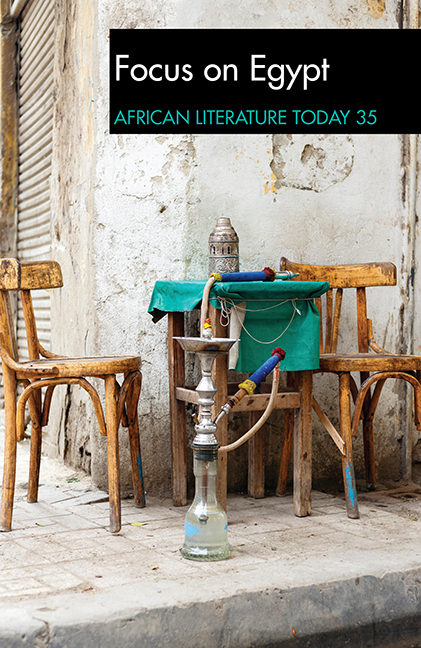Book contents
- Frontmatter
- Dedication
- Contents
- Notes on Contributors
- Foreword
- EDITORIAL ARTICLE
- ARTICLES
- Coping with a Failed Revolution: Basma Abdel Aziz, Nael Eltoukhy, Mohammed Rabie & Yasmine El Rashidi
- The Complications of Reading Egypt as Africa: Translation & Magdy el-Shafee's مترو (Metro)
- Narratives of the ‘Nubian Awakening’: Reclaiming Egypt's African Identity
- Frantz Fanon's Conceptualization of Decolonization in Sonallah Ibrahim's The Committee
- Romance as Epistemological Aesthetic in the Fiction of Ahdaf Soueif
- Literature as Prophecy: Re-Reading Yusuf Idris's The Cheapest Nights
- Travel & Discovery: Hopes for a New Egypt in Mohamed Salmawy's Butterfly Wings
- The Symbolic Relevance of the Use of the Eye in Nawal El Saadawi's Two Women in One & God Dies by the Nile
- African Epics: A Comparative Study of Sundiata & Al-Sirah al-Hilaliyyah
- Conversations with Nawal El Saadawi: Online interview
- FEATURED ARTICLES
- LITERARY SUPPLEMENT
- TRIBUTE
- REVIEWS
- Reviews of Nigerian Poetry
Romance as Epistemological Aesthetic in the Fiction ofAhdaf Soueif
from ARTICLES
Published online by Cambridge University Press: 24 August 2019
- Frontmatter
- Dedication
- Contents
- Notes on Contributors
- Foreword
- EDITORIAL ARTICLE
- ARTICLES
- Coping with a Failed Revolution: Basma Abdel Aziz, Nael Eltoukhy, Mohammed Rabie & Yasmine El Rashidi
- The Complications of Reading Egypt as Africa: Translation & Magdy el-Shafee's مترو (Metro)
- Narratives of the ‘Nubian Awakening’: Reclaiming Egypt's African Identity
- Frantz Fanon's Conceptualization of Decolonization in Sonallah Ibrahim's The Committee
- Romance as Epistemological Aesthetic in the Fiction of Ahdaf Soueif
- Literature as Prophecy: Re-Reading Yusuf Idris's The Cheapest Nights
- Travel & Discovery: Hopes for a New Egypt in Mohamed Salmawy's Butterfly Wings
- The Symbolic Relevance of the Use of the Eye in Nawal El Saadawi's Two Women in One & God Dies by the Nile
- African Epics: A Comparative Study of Sundiata & Al-Sirah al-Hilaliyyah
- Conversations with Nawal El Saadawi: Online interview
- FEATURED ARTICLES
- LITERARY SUPPLEMENT
- TRIBUTE
- REVIEWS
- Reviews of Nigerian Poetry
Summary
In this globe-scattered [Sri Lankan] family, wespeak only of two kinds of marriage. The first isthe Arranged Marriage. The second is the LoveMarriage. In reality, there is a whole spectrum inbetween, but most of us spend years running awayfrom the first toward the second. …
The rule is that all families begin with amarriage. And the other way around. (Fromthe novel Love Marriage by V.V.Ganeshananthan)
Ahdaf Soueif(b. 1950) is one of the few Egyptian authors writing inEnglish, and probably the most well known. Born in Cairo andeducated in both Cairo and England, Soueif combines activismand art in a range of genres that encompasses short stories,the novel, autobiography and essays. Translation, both ofher own work into Arabic and Arabic publications intoEnglish, is not only part of her professional repertoire,but broader questions of linguistic and cultural translationare key themes of her fiction. Soueif has won a number ofliterary awards, and was shortlisted for the Booker Prize in1999 for her second novel, The Map of Love(1999). Although her literary reputation is not in need of‘favourable mention’ by intellectual and scholarlyluminaries, it seems remiss to neglect the importanceaccorded her first novel, In the Eye of theSun (1992), by Edward Said. ‘The Anglo-ArabEncounter: On Ahdaf Soueif’ in the collection,Reflections on Exile (2002), suggeststhat Arab-Anglophone crosscultural, translational exchangeis inherent in Ahdaf's project through the mere fact of therepresentation of Arab culture through the English language,refracted through English literature and culture. Ahdaf'sfiction is striking for its acknowledged intertextualengagements with English literature, especiallynineteenth-century literature. Furthermore, the novel'sinherent structural ‘worldliness’, using the term in itsSaidian sense, signifies the emergence of Arabic literaturefrom the constraints of narrow nationalism into a liberatoryinternationalism. What Said observes about Soueif's firstnovel may as aptly be applied to her second novel,The Map of Love. Both novels are thefocus of this essay, but through the lens of questions ofhuman relations, which are a noticeably neglected dimensionof cultural and literary studies generally.
- Type
- Chapter
- Information
- ALT 35: Focus on EgyptAfrican Literature Today 35, pp. 72 - 88Publisher: Boydell & BrewerPrint publication year: 2017



